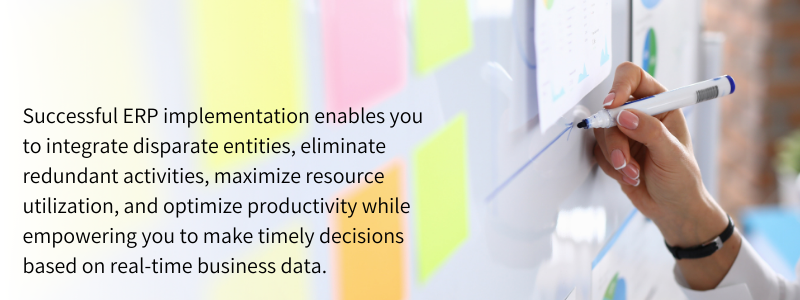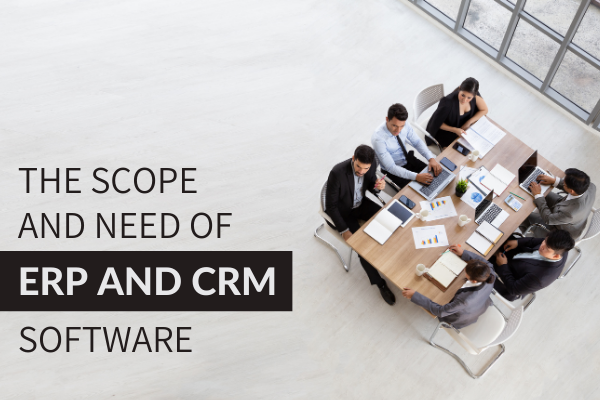ERP vs CRM Software
While entire business operations rely on both enterprise resource planning (ERP) and customer relationship management (CRM) software, a simple analogy to describe the primary difference between these two systems is the type of organizational data they deal with.
An ERP application helps you manage all departments across your organization, whereas a CRM solution stores data that could be used by the marketing, sales, and customer service teams. Furthermore, some ERP systems even come integrated with CRM components, while vice-versa does not exist.
ERP and CRM systems even use different approaches to increase your business profitability. An ERP solution majorly focuses on increasing productivity and cutting overhead costs. CRM software works to increase sales volume and improve customer experiences.
What is ERP Software?
ERP software comprises of an integrated suite of powerful and strategic business process management modules that are comprehensively devised to streamline the business functions and digitally manage all operations within your organization. It has a centralized database that stores all information into one comprehensive information system and allows authorized individuals across your entire organization to access the data to improve workflows.
An effective ERP software enables you to streamline and automate your tedious manual tasks, helping your employees utilize their working hours more productively. This increases the efficiency of business processes and reduces operational costs.
The Scope and Need of ERP
The business functions that might have initially started under your supervision, initially with the help of manual use of basic digital systems, are bound to grow complex as your company expands in terms of manpower, clientele, revenue, expenditure, production capacity, logistics, location, etc. When this happens, manual supervision becomes almost impossible. This is where the need for efficient ERP software arises.
Successful ERP implementation enables you to integrate disparate entities, eliminate redundant activities, maximize resource utilization, and optimize productivity while empowering you to make timely decisions based on real-time business data.
What is CRM Software?
Where ERP system manages your business, CRM software is used for managing customers. With the help of an efficient CRM solution, it becomes easier for you to keep track of your service and sales teams' interactions with your prospects and existing customers.
A CRM system is used to automate and synchronize marketing, sales, and customer service activities. It is integrated with tools to record and manage contact information, phone calls, feedback, and other transactions with the customers to fuel lead generation and help you keep them engaged. This, in turn, enhances your business's growth opportunities while generating maximum sales and profit.

The Scope and Need of CRM
Customers are important for your business growth. You need to plan the right strategy to build and maintain a long-lasting relationship with them. A CRM solution makes this easier for you.
When successfully implemented, the CRM software can help you efficiently handle information related to all your prospective customers and clients while ensuring that their needs and feedback are effectively tracked and monitored.
Further, the CRM system integrates sales, marketing and customer service data into one, easily accessible database. This helps you streamline the business processes and use the information to manage all aspects, starting from customer acquisition to retention.
How to Decide if you Need a Business Management System?
Both ERP and CRM systems provide your business with many benefits. However, there’s no hard-and-fast rule about the right time to take the plunge. Implement the right business software when you need one. We’ve listed the major identifiers that would help you decide.
Signs you Need a CRM System
You’re forgetting to follow-up with prospects on time
When you deal with many prospects and forget to follow-up with them on time, it often results in losing your leads to your competitors.
Your customer interactions are difficult to manage
When your prospects and customers are interacting with multiple reps, it limits your team's visibility into their interactions, and over a period, they lose track of what has been communicated.
Your sales cycle is lengthy
When you have a lengthy sales cycle, you are not likely to remember about each prospect in your sales pipeline, and what was discussed with them in the last call.
You have a complicated reporting structure
When your employees need to manually enter data for generating reports, it is time-consuming and is never free from human errors.
Your customer service is not satisfactory
When you are not able to proactively anticipate your customers' needs and fulfil them due to shortcomings in your service, it leads to dissatisfaction among them.
Signs you Need an ERP system
You use separate software for different processes
When you use disparate systems to manage different operations, it hampers your data accuracy and creates a ripple effect on overall business productivity.
You don't have easy access to your business information
When you rely on siloed systems and spreadsheets, employees across your company are unable to access the key business data immediately when needed.
Your existing processes are inefficient
When you rely on manual methods for managing business operations, alongside working with data redundancy and human errors, there are constraints and restrictions in the smooth running of processes.
You struggle to deal with tedious reporting processes
Your manual reporting method lacks the most crucial aspects, that is, meeting accuracy and standards. This makes it a time-consuming practice.
You have a complicated IT process
When you have multiple systems, your IT department needs to customize, integrate, upgrade, and maintain each regularly, adding up the complexity and overhead costs.
Choosing the Right Solution
Choosing the right business management system is a daunting task, which requires careful planning, complete understanding, and in-depth research.








